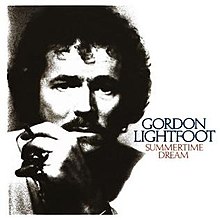| Summertime Dream | ||||
|---|---|---|---|---|
 | ||||
| Studio album by | ||||
| Released | June 1976 | |||
| Recorded | December 1975 – January 1976 | |||
| Studio | Eastern Sound Studios, Toronto | |||
| Genre | Progressive folk [1] | |||
| Length | 37:26 | |||
| Label | Reprise | |||
| Producer | Lenny Waronker, Gordon Lightfoot | |||
| Gordon Lightfoot chronology | ||||
| ||||
| Singles from Summertime Dream | ||||
| ||||
Summertime Dream is Canadian singer Gordon Lightfoot's eleventh studio album, released on the Reprise Records label in 1976. It peaked at #1 on the Canadian RPM national album chart, and #12 on the US Billboard pop chart. [5]
Contents
- Track listing
- Side 1
- Side 2
- Chart performance
- Weekly charts
- Year-end charts
- Personnel
- References
- External links
The album marked Lightfoot's commercial zenith in a remarkable period of popularity which had begun with the 1970 hit, "If You Could Read My Mind". He would not achieve the same level of commercial success through to his death in 2023.
The album shot to popularity on the back of the haunting ballad, "The Wreck of the Edmund Fitzgerald", which told the story of the final hours of the iron ore freighter SS Edmund Fitzgerald which had sunk on Lake Superior in November 1975. The song remains popular to this day and has been credited with making the sinking of Edmund Fitzgerald the most famous maritime incident in the history of the Great Lakes.
"The Wreck of the Edmund Fitzgerald" reached #1 in Canada on November 20, 1976. [6] In the US, it peaked at #2 on the pop chart and #50 on the country chart while "Race Among the Ruins" peaked at #65 on the pop chart.
| Review scores | |
|---|---|
| Source | Rating |
| Allmusic | |
| Rolling Stone | (not rated) link |